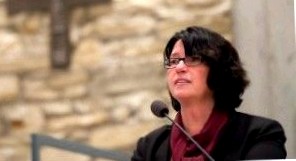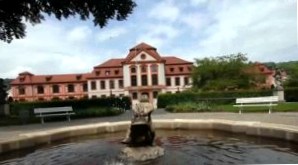
Gabriele Gien © Sebastian Widmann (KNA)

Gien becomes president of Catholic University of Eichstatt-Ingolstadt
Gabriele Gien becomes first woman to head Catholic University of Eichstatt-Ingolstadt. In the past years the search for a president had failed several times. Gien has previously served as acting provost of universities.
Gien, a linguist and literary scholar, was named president Wednesday by an election panel of representatives from the University Council, Senate and Board of Trustees. Gien prevailed over Kiel astrophysicist Wolfgang J. Duschl (58) through. She had already been acting university director since fall 2014. The new president begins her five-year term on 1. October on.
The 54-year-old Gien was born in Munich. She initially went into teaching after graduation. After completing her doctorate and working as an academic in Augsburg and Freiburg, the married mother of two was appointed to the chair of German language and literature at the KU Eichstatt-Ingolstadt in 2009. A little later, she also became vice president.
Bishop congratulates
One of the first well-wishers was Eichstatt Bishop Gregor Maria Hanke: "I thank her for her great commitment as interim president. During this time, they initiated and initiated important and good directions for the university. Her election as president ensures a seamless continuation of the line she has taken." As a local bishop and member of the foundation board, he is pleased to be able to continue the proven good cooperation between the diocese and the university now with her as elected president, Hanke said Wednesday.
Bavarian dioceses increased grants
The Catholic University of Eichstatt-Ingolstadt (KU) is the only Catholic university in the German-speaking world. Emerging from a seminary and a teacher training college, on 1. In April 1980, the Vatican recognized the university as a Catholic university. The then Munich Cardinal Joseph Ratzinger played a significant role in this. Here's why Pope Emeritus Benedict XVI. Today one of the honorary doctors of the KU.
KU is one of the smaller universities in Germany. The picturesque location in the Altmuhl Valley is very popular with students, who also appreciate the personal study atmosphere. Currently, about 5.000 students enrolled. Interdisciplinary central institutes for Latin American Studies, Family and Society, Central and Eastern European Studies and, most recently, a Competence Center for Flight and Migration give the KU a profile in terms of content. In addition, the university is considered a pioneer in sustainability.
The seven Bavarian bishops recently increased their financial commitment to the KU to a good 15 million euros a year, which is about a quarter of the regular budget.
Difficult search
The search for a new president had failed repeatedly in recent years. The Eichstatt candidate merry-go-round turned quickly, several times the election rules were changed as well. In 2011, the carrier's favorite theologian and ethicist, Andreas Lob-Hudepohl, then KU's interim chief, surprisingly lost out to German-American Dominican Richard Schenk. The latter later gave up the office, officially for health reasons.
Under Gien's interim leadership, the situation calmed down. Augsburg's auxiliary bishop Anton Losinger became the new chairman of the university's board of trustees; education expert Barbara Loos was entrusted with the leadership of the university's board of prominent members. Most recently, Gien was able to boast new highs in student numbers, new appointments and external funding.
Ecclesiastical declaration of no objection
The election committee had initially invited seven candidates to an internal presentation. Three remained, all received the "nihil obstat" from Rome. Past elections had already failed because of the lack of an ecclesiastical declaration of no objection.
The foundation and the university reportedly successfully negotiated with the trio in the event of an election — another lesson learned from bitter experiences in the recent past. In 2009, it was not possible to elect someone who had already been elected, because his subsequent demands could not be met. In 2014, shortly before the finals, more and more candidates got lost, until only one candidate was left — too few for a real election, which was then cancelled.
Pope highlights importance of KU
The Pope recently emphasized the importance of the university with surprisingly clear words. It was "of great value for all of Germany," Francis declared. He called on the German bishops to support the university "in order to strengthen its supra-regional significance and to promote interdisciplinary exchange on questions of the present and the future in the spirit of the Gospel".